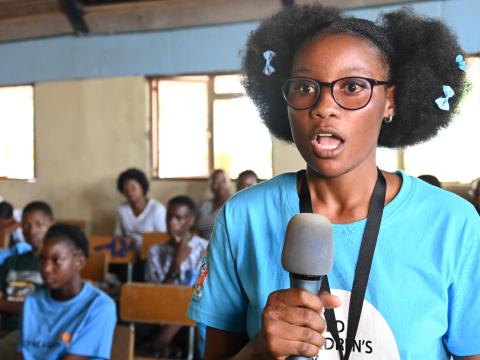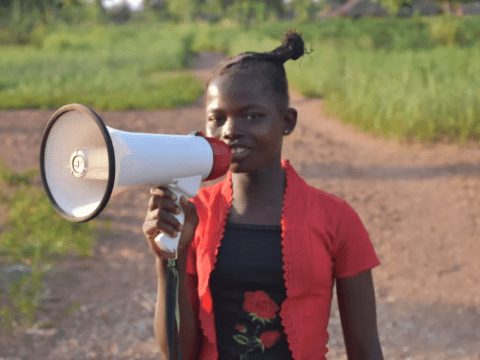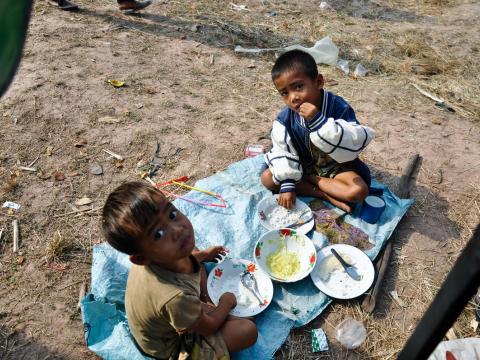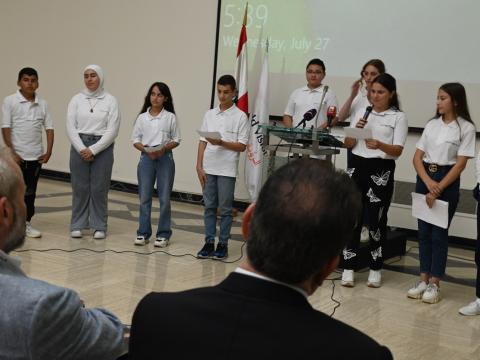
History in the making might end violence against children
Carol Emma Mweemba is hopeful an upcoming historic conference will succeed because children have a say and a seat.
25 October, 2024
Despite decades of efforts to try and eliminate violence against children, recent studies show that countries have not entirely outlawed and enforced prohibitions on all forms of violence against children. A report published by UN Special Representative Najat Maalla M’jid reveals that, in fact, violence against children is at an all-time high globally, and it continues to rise.
For example, an estimated 1 billion children suffer some form of violence annually. Almost 300 million girls and boys between the ages of 2 and 4 experience physical or psychological violence from parents or caregivers frequently. In addition, 160 million children are involved in child labour and 12 million girls are married before the age of 18.
These statistics and the stories behind them are a sad reminder that efforts so far still need to be amplified if children across the world are to achieve life in all its fullness and live in a world free of violence.
A moment of promise and potential
Najat Maalla M’jid has emphasised that “by working together, states and stakeholders can reverse this appalling trend”. The next opportunity to realise this is the first-ever Global Ministerial Conference on Ending Violence Against Children, taking place in Bogota, Colombia in November. This conference will go down in history as an inaugural global event where governments, civil society organisations, children, and survivors of child violence came together at a critical moment in a shared responsibility to commit to protecting children from all forms of violence.
Alongside the dialogues, knowledge sharing, and connections that will be made during this event, there is an expectation that new and renewed commitments will be made to ending one of the biggest threats to children and young people.
Nothing about them without them
World Vision firmly believes that children are not citizens of the future but of the present. They must have a say in discussions and decisions that affect their now and next. Therefore, our staff and partners consulted hundreds of children across the globe to highlight what world they aspire to see and what their expectations are from governments to make their dreams come true.
Children from Brazil, Colombia, the Democratic Republic of Congo, Eswatini, Mozambique, Indonesia, Sri Lanka and Zambia have expressed their aspiration to see a safe world and are asking global leaders to take action to implement laws protecting children from all forms of violence, including child marriage, sexual exploitation, child labour, physical and mental abuse.
Children have called on governments to take the following actions if the fight against child violence and exploitation is to be addressed:
To fulfil global education commitments to keep girls in school and reduce the chances of children getting married.
To champion gender equality and end gender-based violence.
To prioritise displaced and affected children wherever they may be, protect children’s futures, and honour climate change commitments.
To promote birth registration to give legal registration of children’s identity to allow them to access essential fundamental rights.
To outlaw corporal punishment in learning institutions and strengthen penalties for teacher misconduct.
More importantly, they want a ‘seat at the table’. They want to be engaged and empowered in the decision-making process in their communities on protection from violence. They want to be recognised as partners in finding innovative solutions that could eliminate all forms of violence against children and create an enabling environment that allows children to thrive.
Early input to the conference
Thanks to National Preparatory Sessions, the Ministerial Conference has been listening to children’s voices from all over the world. For example, in Sri Lanka, more than 1,200 children made recommendations to their government to prioritise child participation, enforce laws to protect children and improve services for child survivors of violence. In Zambia, children emphasised to their government to promote birth registration, prevent child marriages, strengthen penalties for teacher misconduct, and enhance school feeding programs to safeguard children from violence.
The pledges governments prepared to be delivered during the Global Ministerial Conference also substantially contribute to what children worldwide want to see happen to have a world that promotes their well-being. This is a cause for celebration because children’s voices are critical; they live the realities of violence and identify the best strategies to address the injustice that they experience and witness. Bringing their voices into the conversations is not just a step but a leap ahead in ensuring that governments prioritise the right solutions to end violence and genuinely address the needs of children and their experiences.
Next steps post-conference
I look forward to seeing how pledges prioritised during the Global Ministerial Conference will be prioritised post-conference in different countries and how such strategies can be adapted and implemented across countries to amplify impact. We remain hopeful that the outcomes of the Ministerial Conference, which would not have been possible without many stakeholders making bold decisions to support and participate in the event, will transform actions that will prioritise children everywhere and see an end to suffering for children worldwide.
To learn more about World Vision’s involvement in the Global Ministerial Conference to End Violence Against Children, click here
Carol Emma Mweemba is Policy Advisor on Ending Violence Against Children at World Vision International and has seven years of valuable experience advocating for the protection and rights of vulnerable children. Contact her on LinkedIn


